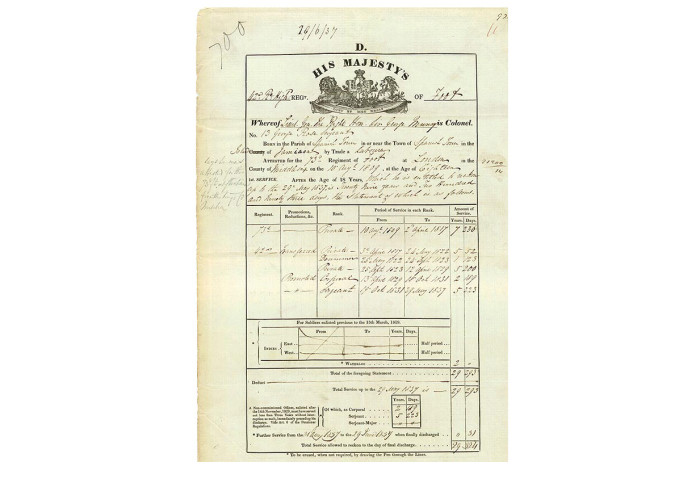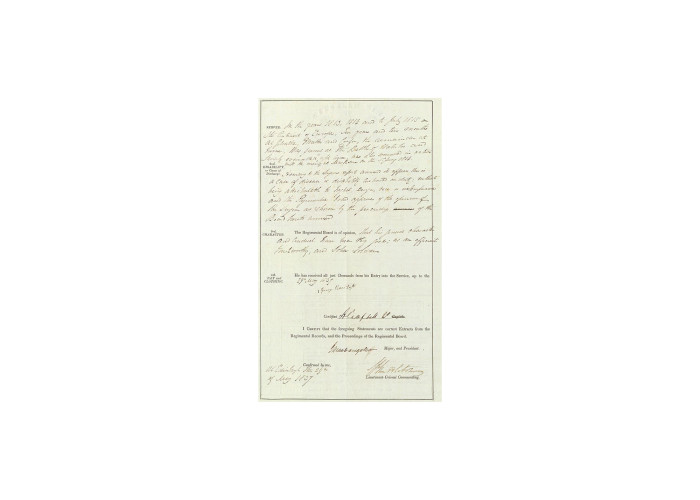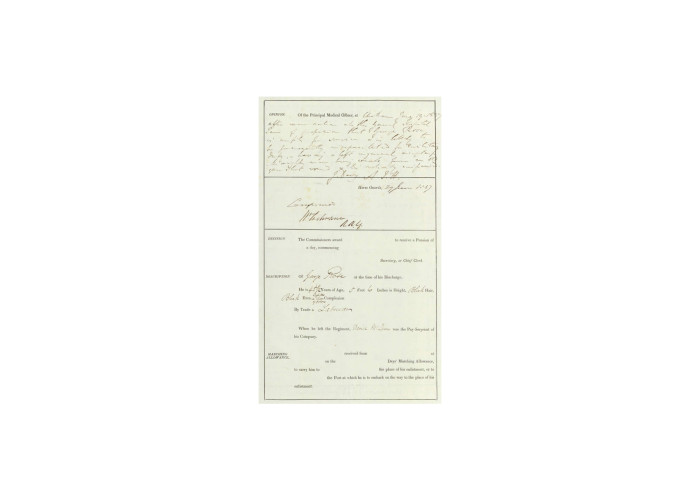Discharge papers of George Rose, a Black soldier at Waterloo
Theme: Challenging slavery: abolition and opposition, French revolutionary and Napoleonic wars (1792-1815)
Discharge papers are the records of a soldier’s career in the British Army, given to every veteran on leaving the Army due to age or sickness. The discharge papers of George Rose describe the remarkable military career of a Black soldier who fought at Waterloo and served in the British army for nearly 30 years, highlighting the often-forgotten role of Black soldiers during the Napoleonic wars.
George Rose was born into slavery, in Spanish Town Jamaica in around 1791. By 1809 he had escaped to Britain. The papers show that he enlisted in the British Army, into the 73rd Foot, in London, at the age of 18. As a member of the British Army at this time, previously enslaved Black soldiers became ‘freemen’ and were entitled to the same pay and conditions as White soldiers.
Rose served in what is now Germany and The Netherlands – where he was wounded. He went on to fight at Quatre Bras and Waterloo where he was again wounded – this time severely when he suffered a gunshot to his right arm. Between 1817 and 1837 he saw service with the 42nd Foot (the famous Highland ‘Black Watch’), serving in Ireland, Gibraltar, Malta and Corfu. In 1831 Rose was promoted to sergeant, making him the most senior Black soldier in the British Army at the time.
Severely debilitated from his wounds and nearly 30 years of service, Rose was discharged in 1837 and given a pension. The discharge papers describe him as ‘an efficient, trustworthy and sober soldier’. His pension was 23 pence per day – a relatively large sum for the time. He returned to Jamaica in 1849 and died in 1873, close to where he had been born.
This object comes from the National Archives. You can read transcripts of these discharge papers here: National Archives website. Their collection also includes the discharge papers of William Affleck who was born on the island of St Kitts and enlisted in the British Army in 1801 in Hounslow. He spent almost all his army career as a trumpeter before being discharged in 1819 on the grounds of poor health.
A representation of George Rose – in his redcoat uniform, eating from a mess tin – can be seen at the Black Watch Museum in Perth.
Use our Classroom resources to investigate this object and the themes of the Abolition of Slavery and the Napoleonic Wars further.
Highlights:
- Using objects, artworks and other sources to find out about the past
- Fascinating facts
- Reliable evidence
And much more…
Sources & acknowledgements
This object description and its related educational resources were researched and written by our team of historians and education specialists. For further information see the item’s home museum, gallery or archive, listed above.
-
Education overview
Learn more about the 73rd Regiment of Foot on the Waterloo 200 Schools E-Book. Oasis Academy Short Heath have researched the life of Private William Bayley and created a tribute to his service. To find out how to sign up your class and discover your local Waterloo history, contact [email protected].
-
Curatorial info
- Originating Museum: National Archives
-
Use this image
You can download and use the high resolution image for use in a non-profit environment such as a school or college, but please take note of the license type and rights holder information below
- Rights Holder: National Archives
- License Type: All Rights Reserved
Find it here
This object is in the collection of The National Archives












